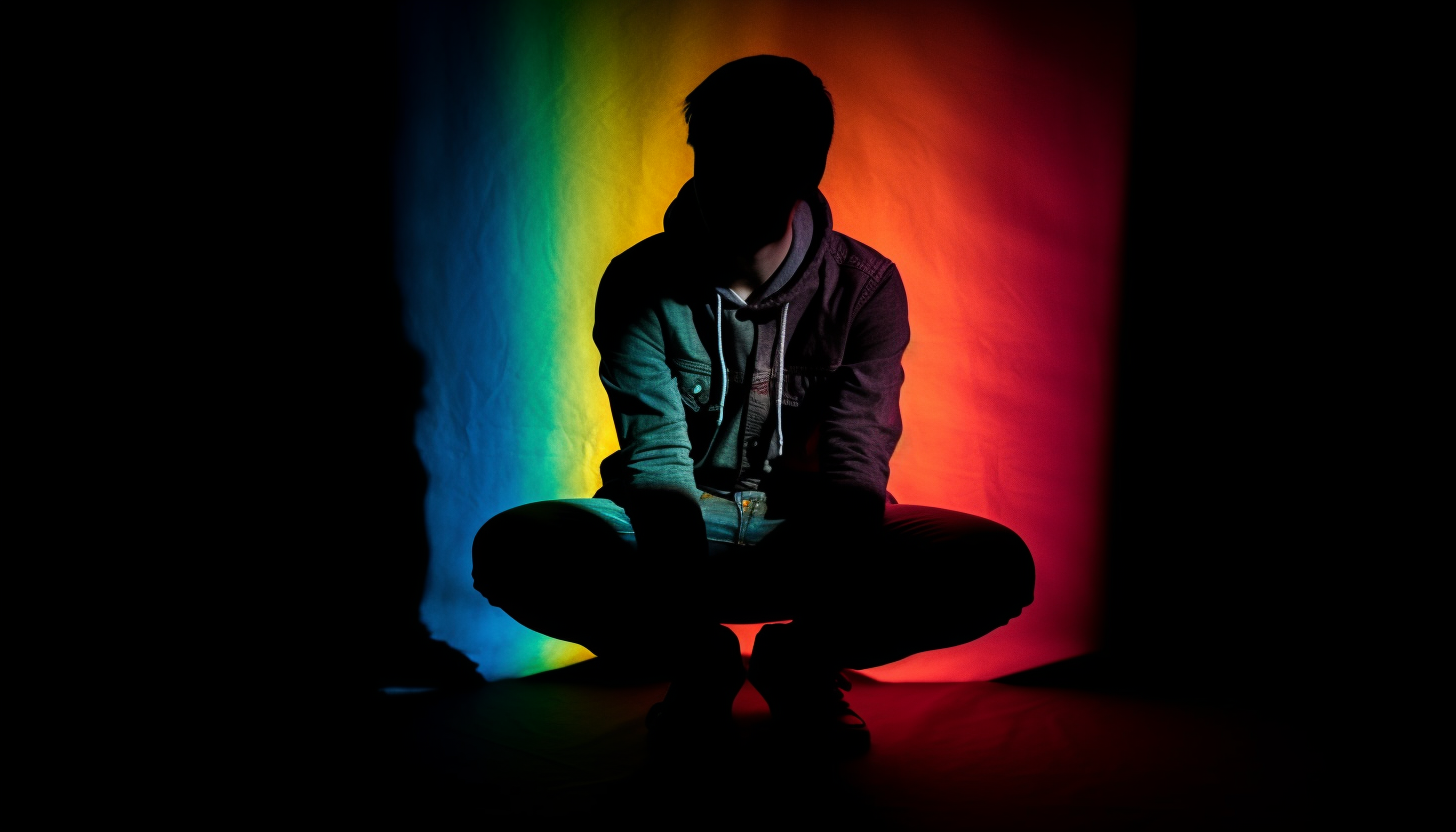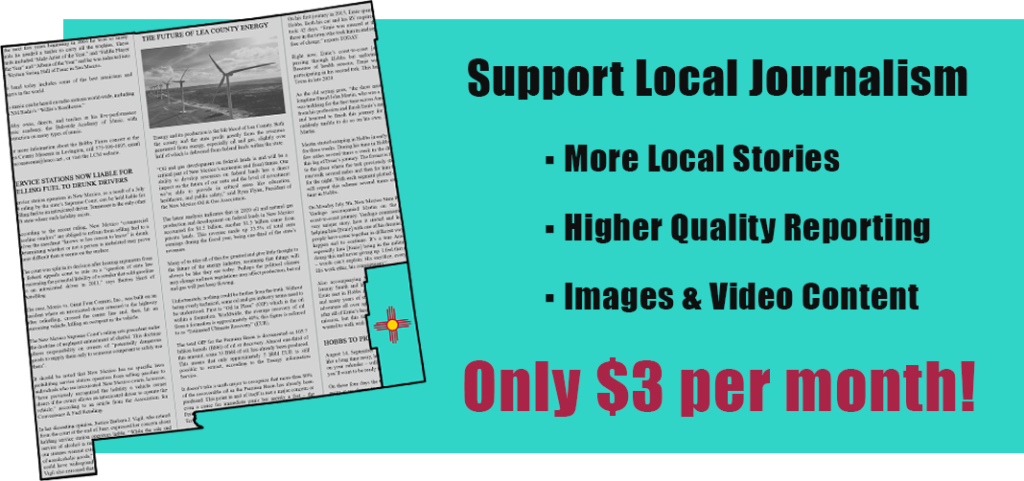
In 1994, the US Military officially adopted the policy of ‘Don’t Ask, Don’t Tell’ regarding homosexual servicemembers. The policy prevented homosexuals in the military from talking about or admitting to their sexual orientation, but as a compromise it allowed them to continue their military service without fear of being discharged for it. ‘Don’t Ask, Don’t Tell’ lasted until 2011 as official US Military policy.
Looking back from 2023, this might look like a very outdated policy but for many LGBTQ people today in Lea County, ‘Don’t Ask, Don’t Tell’ is the unwritten policy they’re living under. These are not people engaged in military service; they are regular citizens living within and as part of the local community, but they feel unable to fully express themselves for fear of “ruffling feathers”.
“It’s more accepted, but not talked about,” says Maggie Payen of Lovington. “I know the people that I talk to, they’re very open about being out. They live their lives, and they have families, and they do whatever. But when we’re in public, it’s like, as a gay or lesbian person, you always have that defense. You’re always kind of guarded because people in this area seem to frown upon it.”
This is why if you look around the towns of Hobbs, Lovington, Tatum, Jal or Eunice, you’re unlikely to see a single rainbow flag during Pride Month. No towns are hosting Pride Parades or any other Pride-related celebrations, and local businesses are not engaging in the “Rainbow Capitalism” that we see nationally across social media and television news.
So it’s no surprise some people might think there is little to no LGBTQ community here, and perhaps that’s the point of the unwritten rule. If we all ignore something, does it exist? However, this couldn’t be further from the truth. Lea County has a rather large and active LGBTQ community.
In fact, for over a year a Lea County Pride group has existed with regular meetings and social events taking place. Stephen Helmreich is a pastor at Trinity Lutheran Church and serves on the executive committee for Lea County Pride. According to Helmreich, there are about 60 people on the group’s mailing list. Their Facebook page has about 140 followers, which includes LGBTQ+ people and allies.
“It provides a safe space for LGBTQ people to get together in an atmosphere of support,” Helmreich says of the Pride group. “A place where they can really be themselves and share their experiences without being worried about being shamed or not accepted.”
Helmreich is a gay man who grew up in Indiana in the 1950s. Society’s views on homosexuality were much more antagonistic then, and as a result Helmreich did not come out publicly until his 40s. “I’d probably say I lived as a straight person,” says Helmreich. “I had a girlfriend. I lived with a woman for a couple of years.”
It isn’t uncommon for LGBTQ people to live a life contrary to who they are, due to societal and family pressures. The attempt to conform to a perceived “norm” can cause serious psychological issues, and suicide rates are notoriously high among the LGBTQ community.
However, with acceptance comes hope. A 2017 study found that as states legalized gay marriage, suicide rates among high schoolers decreased. According to The Trevor Project, communities that are accepting of LGBTQ people have lower reported rates of suicide attempts compared to communities that are not accepting.
While most local LGBTQ people interviewed reported feeling at least somewhat accepted, not all felt it is easy to be out and open about who they are here.
Payen described how she encounters some negativity, even from people she’s known for a long time. “They have their opinions,” she says, “and it’s not very positive. So I tend to be like, ‘You know I’m gay, right? I’m part of that too. You’re kind of offending me a little bit, you know.”
“I’m aware of negativity, particularly in churches,” says Helmreich, though he admits the community has been very supportive of him personally. He also understands that it’s very different for trans people.
“Being transgender around here is somewhat scary,” says Jake K., a transmasculine person and founding member of the Lea County Pride group. He also serves with Helmreich on its executive committee. “Truthfully, I’ve had more problems with physicians not wanting to treat me because they do not feel that their ethics apply to me. So, I’ve had two physicians drop me, one after having a screaming argument.”
Healthcare support is a prevailing issue for trans people in this community. Lea County already has limited options for healthcare in general, but trans people face additional hurdles. As with Jake, some local medical experts will simply refuse care or may not understand how to provide care for trans people. The parents of a 12-year old trans girl explained their difficulties finding support in the area. “Therapy and resources and stuff like that, it’s just not there,” says her mother. They understand that it will be a struggle to find the care their daughter needs in this area.
Fortunately for families like this, New Mexico recently passed a ground-breaking law: The Reproductive and Gender-Affirming Health Care Freedom Act. This law goes into effect on June 18 and prevents local governments from interfering with and restricting healthcare for trans people. However, this doesn’t solve the current problem for the area, which is a lack of medical and mental health resources locally.
Trans people in the area also face harsher judgment and feel less safe than cisgender (a term referring to people whose gender identity matches their gender assigned at birth, sometimes shortened to “cis”) LGBTQ people. “I, personally, have never been assaulted,” says Jake, “but I have had people use pejoratives around me or to me.”
Though New Mexico ranks among the top states for equality for LGBTQ people, Texas is among the worst. Lea County’s proximity to one of the most anti-trans states in the U.S. has some people here concerned, particularly as visiting destinations such as Midland/Odessa and Lubbock is commonplace for local residents. “Being so near to Texas and the laws they have recently passed, has scared the Lea County LGBTQ community,” says Jake. “These new laws make going to Texas dangerous for about half the Lea County Pride membership. Just by being ourselves, our very existence is illegal in Texas.”
At home, he faces less danger, but still encounters hostility. “I am constantly misgendered, but there is so little education about LGBTQ issues in this area, this is no surprise.”
On the reasoning for the lesser hostility in Lea County, Jake explains, “I do think the acceptance is more from the mentality of live and let live, and not from any active form of acceptance. In fact, mostly I find that if you don’t mention being LGBTQ, no one else will mention it either. However, if you try to live your life out and proud, there can be problems.”
This is what has Lea County solidly in the ‘Don’t Ask, Don’t Tell’ category. While LGBTQ people are mostly accepted, it comes with the implicit agreement that they keep it to themselves.
“It’s kind of like ‘Okay, I know you’re gay, but let’s just not talk about it,” Payen explains.
This reality underscores the need for Pride celebrations in our community, and groups like Lea County Pride. “I think for people who have been bullied and/or made fun of, or lost jobs, because of sexual orientation or gender identity, it’s important to be able to take pride in who you are,” says Helmreich, “and not feel that because of that treatment you are less.”
Pride events not only help LGBTQ people feel accepted and find a community, but can also serve to spread awareness and educate non-LGBTQ people about these issues. Misconceptions seem to run rampant, particularly on social media and cable news where outrageous claims are pushed to gain attention.
“We are normal, regular people, like anyone else,” is a sentiment that was echoed by many when it came to the topic of misunderstandings.
“Many people in Lea County just find the members of the LGBTQ community confusing,” says Jake. “Many don’t understand what it means to be LGBTQ except from what they glean from the media, and much of that is incorrect.”
Overall, the biggest needs for the LGBTQ community here come down to acceptance, understanding and access to healthcare. While bringing more healthcare resources to what already could be called a ‘healthcare desert’ is certainly a complicated undertaking, it should not be difficult to improve our acceptance and understanding. Celebrating Pride would be a simple start.
Payen says she would like to see something done in the community, particularly because of the benefits it would have for young LGBTQ people working to figure things out and looking for acceptance and community. “I think it’s a good thing to celebrate who we are and have young adolescent kids be comfortable seeing that it’s not something bad.”


